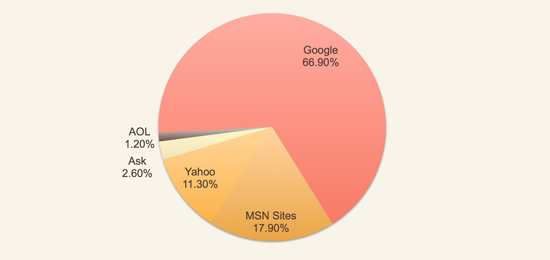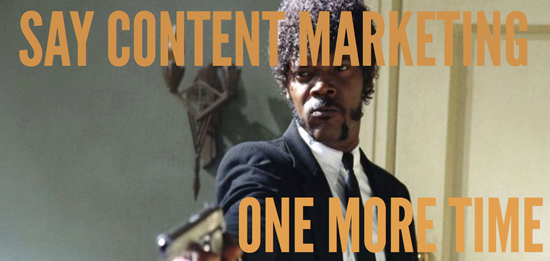As the entire search world knows, Matt Cutts released a post last week – I’m paraphrasing – warning us that Google now considers “low quality guest posting” to be spam under their guidelines and will begin to take action in accordance with those beliefs.
I don’t plan to revolve this post entirely around that announcement. If you didn’t see Matt’s post coming at least a year ago, you were either oblivious or in denial.
 Do you approve of the tactics Google uses to fight web spam? Has it gone too far? Is Google hypocritical, and not enforcing its web spam rules on its own web properties? How can webmasters fight back?
Do you approve of the tactics Google uses to fight web spam? Has it gone too far? Is Google hypocritical, and not enforcing its web spam rules on its own web properties? How can webmasters fight back? Join the discussion in the comments section.
THE ABILITY TO SCALE = THE EVENTUAL BLACKLISTING OF A TACTIC
Any link building tactic that can be scaled – and cannot be “controlled” by Google in regards to their algorithm not being manipulated by it – will eventually become part of Google’s “link scheme” list, complete with a FUD campaign within the search community centered around it to scare “in the know” webmasters into compliance.
Next up, we’ll see a larger brand “nailed” with a penalty for guest posting – complete with the accompanying mainstream media coverage of that nailing so that Google can get their FUD campaign out into the mainstream media. The larger brand will then claim ignorance at breaking any guidelines (or blame their SEO company), do a bunch of articles sharing Google’s “this tactic was bad” message, and then have their penalty revoked – all within a 1 to 2 week window. (The latest one of these “nailings” was Rap Genius.)
THE INDUSTRY RESPONSE ROLLS IN
As would be expected, comments began to flood in to Matt’s post (at the time I’m writing this post, there are 420+ comments) while social media streams were just slightly short of all out panic and blogs within the industry published in force with cheers, jeers and the occasional “I told you so” posts.
As one would expect, one of the most shared comments on that post was from search marketing journalist Danny Sullivan (one of the few members of the search community “famous” enough to be listed in Wikipedia under Wikipedia’s arbitrary “people worthy of an entry” guidelines – and rightfully so).
I’d post Danny’s comment here but it’s long, so, ya know…

So you’ll have to go read it if you want to see it in its entirety here. The part of his comment that spurred me to respond was this:
 “I wish you’d just not count the links you don’t think deserve credit.”
“I wish you’d just not count the links you don’t think deserve credit.”
To which I responded with this:
 “The problem there Danny is they can’t successfully find and discredit all of them. They can find and discredit the obvious, but most on their “spam list” done “well” are ones they can’t detect.
“The problem there Danny is they can’t successfully find and discredit all of them. They can find and discredit the obvious, but most on their “spam list” done “well” are ones they can’t detect.
So, it’s easier to have webmasters provide you a list (disavows), scare the ones that aren’t crap sites providing the links into submission and damn those building the links as “examples” – dragging them into town square for a public hanging to serve as a warning to anyone who dare disobey the dictatorship.
Don’t like it? Then move to a different country – despite the fact that on the proverbial internet earth, Google makes up 5 of the 7 continents.”
This morning, after Aaron Wall retweeted the link to my comment, I hit Matt’s post up again and saw him make the following statement in one of his comments:
 “We are taking action against low-quality or spammy sites in order to protect the relevance of our users’ search experience.”
“We are taking action against low-quality or spammy sites in order to protect the relevance of our users’ search experience.”
Normally I would agree with Matt here, believe it or not.
If you actively spam, you’re taking a risk, and you have to be prepared to accept the potential negative (just like you do the positive) consequences of that risk. Back in the day when I participated in “below the board” activities, that was simply how it was. And we accepted that.
THE PROBLEM WITH PENGUIN
The problem with Penguin overall is that Matt’s comment above is false. In Penguin, Google isn’t taking action on “low-quality or spammy sites”. Google is taking action against sites being LINKED TO by “low-quality or spammy sites”.

There are definite instances where a webmaster did not actively obtain these links (and thus, did not “sign up” for the risk in having them, even if they did indeed benefit from the reward).
They won’t tell webmasters what the low quality or spammy links are, yet they “know” what they are enough to punish a site. I used the quotes for a reason.
The reason being because if Google truly knew all of the unworthy links inflating your rankings, they’d simply discredit them as they’ve done with multiple link types in the past.
Matt long ago stated that press release sites had diminished value in regards to getting “links for SEO purposes” and were discrediting them. Then in 2013, Google officially added those same press release links to their link scheme list – implying webmasters using highly optimized anchors within them risk getting hit for them.
Why would they hit you for them if they’ve been devaluing them without penalty since 2005? Because, IMHO, they can’t successfully identify all the sites – many of which are deemed “high authority” – scraping the press release sites and republishing the releases giving you “natural” and highly anchor optimized links.
By scaring – or potentially penalizing you – into adding the nofollow within the release itself, it helps them solve that problem because the scrapers that leave the links in then also include the nofollow as a result.
Back to Penguin. They know some of the crappy links, for sure – but they’re relying on those of you with enough of the “knowns” to be hit to fill them in on even more via the disavow tool.
Then there’s a question of a potential “fall out” effect. If enough disavows of a domain occur, does that domain get hit? How many webmasters does it take not going through the effort to ask for a link to be removed and merely disavowing it before innocent sites are hit by the actions of scared webmasters on the proverbial witch hunt?

But, they’re shitty sites, right? Otherwise people wouldn’t be disavowing them. So who cares?
But here’s the problem – Google’s lack of transparency coupled with financially devastating punishment is causing desperate webmasters to disavow links from sites where they merely have heavy anchors, gave away a review product to the webmaster and legitimate links that they want killed off, you know, just in case.
And now, we’ve added sites who allow guest posts to the chopping block. And if you think webmasters aren’t running around – right as you’re reading this post – disavowing legitimate sites where they have legitimate, useful guest posts (I’m not talking “made for guest posts” sites here people) then your head is buried in the sand.
THE PROBLEM WITH PANDA
In Panda, Google hits false positives because they are not able to always accurately deduce who is the original source of content.
They go by some measure of authority as if the big guys would never steal from the little guys (and they have an even harder time accurately deciding “authority” when it comes to determining an original source when it comes to non big brands).
Manufacturers who don’t know any better provide merchants and affiliates with the same product feeds they use on their own sites. If the merchant or affiliate using that feed has been around longer than the manufacturer, or has better links than the manufacturer, or is Amazon, then the manufacturer gets Pandaized.
Sites like Yahoo Answers and Amazon’s Askville have users who plagiarize small content sites on a regular basis – often posting a full article from an outside website without crediting the source.
Sites like Business Insider republish blog RSS feeds and you either have to forgo the publicity or hope to God you have a decent enough link profile to compete.

High quality and high traffic websites like Huffington Post will republish amazing blog posts they find on the web (with permission). Do you see the source site (Daddy Doin’ Work) ranking for that article? Sure, that may not speak to an entire site getting hit by Panda, but it does speak to Google’s often inability to correctly identify (and not rank the original).
THE PROBLEM WITH BLIND PUNISHMENT
Google acts like they themselves are some kind of protector – and decider – of what is good and what is evil on the web.
In Penguin, they act like a parent telling a teen that they’re grounded for four specific things their friends did in the last three years of their life – and that they’ll let them off grounding as soon as they apologize for all four specific things done by their friends and identify which friends specifically did them to boot.
But, they have to figure out what it is other people did with no help. When the 16 year old complains this is unfair, they tell them if they don’t like their rules, they’re free not to live in their house.
When in reality, they know that’s not a viable option for them.
In Panda, Google is like a teacher giving you a failing grade because someone else copied off your test – whether or not you knew they were copying from you or that you indeed were the one copied from is irrelevant.

They simply see two identical tests – one from an A student, one from a B student and without question or recourse, they assume the B student is who cheated. You receive the punishment of failing the class and if you don’t like it, you’re free to attend a different school.
DO AS GOOGLE SAYS, NOT AS THEY DO
The best part in all of this is that Google does not lead by example.
Google Local is one of the biggest scrapers on the web. While Google tells review sites not to make pages with nothing but manufacturer information without original consumer reviews available to be indexed by Google, Google Local scrapes address databases, other review sites and then makes the pages available with no original reviews of their own on publication.
And let’s not even “go there” with the Knowledge Graph.
Do as Daddy says, not as Daddy does. Reminds me of the old 80′s say no to drugs commercial – “I learned it by watching you dad!”.
“We” are not allowed to give away products to bloggers to review unless we demand a nofollow on the post. But, Google can give away thousands of Android phones in 2009 resulting in thousands of links without any issue or slap from Google’s search division.
In fact, they’ve done it over and over again – with no recourse.
But, it’s all about “intent” right? Too bad you can’t scale determining intent.
Google says it can’t be “responsible” for moderating the content of every comment published on YouTube, but it requires AdSense publishers with UGC content be able to do so to stay in compliance with their policies.
Google says embedding links within widgets without a nofollow is not only bad, but cause for penalization within their search results. However, as Dave Naylor noted, it appears Google Maps is exempt from feeling any wrath.
Google says you’re not supposed to add any anchor rich links to your press releases without a nofollow or risk a negative impact on your search results. Yet, when they announced Calico, they put two links within the press release to their own properties using anchor text – without using a nofollow. This of course resulted in straight links from folks who scraped the release. This doesn’t appear to have had any effect on that rank of the page they linked to in the release in regards to ranking on the anchor used.
To be clear, I’m not picking on Matt personally here, even though his post was partially responsible for spurring this post. Google is a huge company and Matt doesn’t run it. I’m sure when Matt is met with examples of the above, he’s sometimes like…

And I’m hoping that after reading this post he’s not feeling like…

But the bottom line is “we’re” given one set of rules (dispersed to us via Matt and the webspam team) while Google and other large brands get to operate under another.
“DON’T MANIPULATE THE LINK ECOSYSTEM FOR YOUR OWN GAIN”
Google says that anything that manipulates the natural link ecosystem of the web is bad. But the largest manipulator of the linking ecosystem today (and has been for a long time) is Google themselves. They created a currency around links, then failed to control it, then issued mandates to alter it to compensate for their failings for their own benefit.
We’re told to “create good content” and our Google rankings will be fine.

I’m sorry, but I live in reality. In reality, creating good content guarantees you nothing.
There’s no guarantee good content will magically be shared.
If it does get shared, and gets shared so much that a larger site republishes it, it could screw me.
If people like it, and link to it with too much anchor, it could screw me.
If not enough quality sites link to it in proportion to the overall inbound links, it could screw me.
If multiple bloggers with a good audience who can give me good exposure, but that also blatantly sell links or publish a lot of guest posts links to it, it could screw me.
If I include a nifty graphic in it and enough people repost that graphic and give me a link credit for being the source, it could screw me.
Over the last two years, the number of don’ts is increasing as quickly as Miley Cyrus’s sluttiness while the number of “dos” continues to dwindle.
Even Danny Sullivan is confused about what the hell he’s exactly expected to do and “allowed” to do to develop links without angering the Google gods in this day and age – as evidenced in his epic rant from SMX West in 2012.
In short, I’m supposed to publish awesome content, not actively promote it and hope that the right ratios of the right type of people (sites) like it and link to it. Oh, and then I’m supposed to cross my fingers and hope that my competitors don’t actively try to fuck with my “create good content” stars aligning.
“YOU CAN ALWAYS TAKE YOUR BALL AND GO HOME”
Of course, Google (and their fanboys) will tell you that you’re free to do whatever you want, and simply accept that you might not appear (well) in Google as a result.
But let’s face it…

That’s some financially devastating bullshit – even to the largest of brands. Just like a tyrannical leader can tell his citizens if they don’t like it, they can move – he knows that the large majority of those citizens have no realistic, viable choice but to endure – and obey – the tyranny.
ZOMG! GOOGLE KILLED SEO!
Hardly. As anyone with an SEO agency will likely tell you, demand for good SEO services has merely increased. Before all the Penguin / Panda craziness, we (SEOs) had one core offering. We helped you get your on site technical shit straight, and helped with building branding and links with the end goal being to get you more exposure in the search engines.
Nowadays, good SEO companies are still offering that, but there’s now a demand (and thus, services) to help Penguinized sites (both deserved and underserved) recover and Pandaized sites (both deserved and undeserved) recover. Because this shit is way too complicated at this point for anyone who doesn’t live and breathe SEO to navigate – especially where false positives are concerned.
Now add in the need to understand on site factors, indexing issues, Schema markup, understanding backlink profiles, how to get keyword data when Google’s holding it hostage (except in regards to paid advertisers), the infusion of Google places, personalization, information architecture, Hummingbird and even the potential social impacts on SEO… and, well… it’s a lot to be “in the know” on.
THE DEATH OF THE “ONE TRICK PONY”
A lot of people who think “SEO is dead” in my opinion, do so because they were “one trick ponies” so to speak. How you “did” SEO or maybe more accurately, what you perceived SEO to be, is partially dependent upon when you entered the industry, IMHO.

Before you get your panties in a wad, I’m not saying there are no good SEOs that entered the industry in its later years (or that more aren’t on their way). I’m simply saying that many people who entered the industry after 2006 had one ranking tactic in their arsenal that they confused with a strategy (and in fairness, for a long time, it could compensate failure to know or implement the multitude of other tactics) – build keyword based links.
And now that building keyword based links has been relegated back to being a tactic and not a strategy, a lot of link builders marketers are standing around with their dick in their hands proclaiming that SEO is dead because they only perceived SEO to be a tactic versus an all encompassing traffic growth and conversion strategy.
WHERE WE GO FROM HERE
If I were to list what I wanted you to take away from this post, it would be this:
- Google’s primary concern is not “the web” or “you” – it’s Google
- Penguin is not always fair – Google knows it but… see #1
- Panda is not always fair – Google knows it but… see #1
- Google talks the talk, but does not walk the walk and there’s nothing we can do about it
- “Creating good content” guarantees you JACK SHIT when it comes to ranking
- SEO is as alive now as it was a decade ago
- SEO has evolved to become the result of an actual marketing strategy versus marketing tactics
- Your pony is dead
So what now? It’s time for marketers to wake up.

From here on out, you need to stop with the tactics. You can’t replace “link building” with “content marketing” and call it a damn day.
From here on out, a marketing plan that consists of (and even more importantly, relies on) “rank well in Google” is a bullshit plan. Because Google doesn’t care about you, or your website or your business. They care about theirs.
From here on out, you work on generating traffic. From here on out, you work on generating branding. From here on out, you work on obtaining customers. From here on out, you work on making your product or service or “value provide” (for bloggers) fucking epic. Not just epic – FUCKING EPIC.
I’m not saying the new SEO is not to do SEO. I’m saying that you need to do things in the most search optimized way as possible, but never losing site of the fact that what you’re supposed to be doing is building a business and not merely building search engine rankings.
By doing so, you’re doing the most defensible thing you can for your business. And, you’ll end up doing the very thing that Google is looking to reward in their algorithm. Google doesn’t want to make websites popular, they want to rank popular websites. If you don’t understand the difference, you’re in for one hell of an uphill climb.
And if Google still screws you at the end of the day – despite you trying your best to “do things right” – doing so is your only chance to survive – and thrive.
This article was originally published at sugarrae.com. The article and its images are provided by and include the opinions of the author. As such, the article does not necessarily reflect the views of WebProNews.